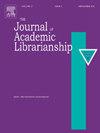Digital inclusion in higher education: A web content accessibility evaluation of best Asian university library websites
IF 2.3
3区 管理学
Q2 INFORMATION SCIENCE & LIBRARY SCIENCE
引用次数: 0
Abstract
Digitization in higher education has opened up exciting opportunities for easy access to a multitude of knowledge sources. These information centers are currently mostly distributed through educational websites. If web content isn't accessible, it denies equal access to information—a basic human right. Breaking these digital barriers is essential for a fair and inclusive academic environment. Persons with disabilities often encounter such barriers when they try to access information from digital resources. This study aims to evaluate the information accessibility status of the best Asian University library websites based on compliance with the WCAG 2.1 standard. The study population consists of the best 50 Asian Universities from Times Higher Education 2024 ranking data. The study employed Website Accessibility Conformance Evaluation Methodology (WCAG-EM) with the combination of WAVE and axe Dev tools. The study found that contrast errors, lack of text alternatives for non-text, missing form labels, etc., are major accessibility issues. And alarmingly, these websites fail to meet even the basic compliance standards established by WCAG. Furthermore, the Kruskal-Wallis test revealed p = 0.073 for WAVE and p = 0.198 for axe Dev, indicating no statistically significant link between website categories based on web performance score. These results underscore the urgent need for action to create an equitable, inclusive web environment.
高等教育中的数字包容:亚洲最佳大学图书馆网站的网页内容可访问性评估
高等教育的数字化为获取大量知识资源提供了令人兴奋的机会。目前,这些信息中心主要通过教育网站进行分布。如果网络内容不能被访问,它就剥夺了平等获取信息的权利——这是一项基本人权。打破这些数字障碍对于公平和包容的学术环境至关重要。残疾人在试图从数字资源获取信息时经常遇到这种障碍。本研究旨在以WCAG 2.1标准为基准,评估亚洲最佳大学图书馆网站的资讯可及性状况。研究对象包括泰晤士高等教育2024年排名数据中亚洲最好的50所大学。本研究采用网站可访问性一致性评估方法(WCAG-EM),结合WAVE和axe Dev工具。研究发现,对比错误、缺乏对非文本的文本替代、缺少表单标签等是主要的可访问性问题。令人担忧的是,这些网站甚至连WCAG制定的基本合规标准都达不到。此外,Kruskal-Wallis检验显示,WAVE的p = 0.073, axe Dev的p = 0.198,表明基于web性能评分的网站类别之间没有统计学上显著的联系。这些结果强调,迫切需要采取行动,创造一个公平、包容的网络环境。
本文章由计算机程序翻译,如有差异,请以英文原文为准。
求助全文
约1分钟内获得全文
求助全文
来源期刊

Journal of Academic Librarianship
INFORMATION SCIENCE & LIBRARY SCIENCE-
CiteScore
5.30
自引率
15.40%
发文量
120
审稿时长
29 days
期刊介绍:
The Journal of Academic Librarianship, an international and refereed journal, publishes articles that focus on problems and issues germane to college and university libraries. JAL provides a forum for authors to present research findings and, where applicable, their practical applications and significance; analyze policies, practices, issues, and trends; speculate about the future of academic librarianship; present analytical bibliographic essays and philosophical treatises. JAL also brings to the attention of its readers information about hundreds of new and recently published books in library and information science, management, scholarly communication, and higher education. JAL, in addition, covers management and discipline-based software and information policy developments.
 求助内容:
求助内容: 应助结果提醒方式:
应助结果提醒方式:


